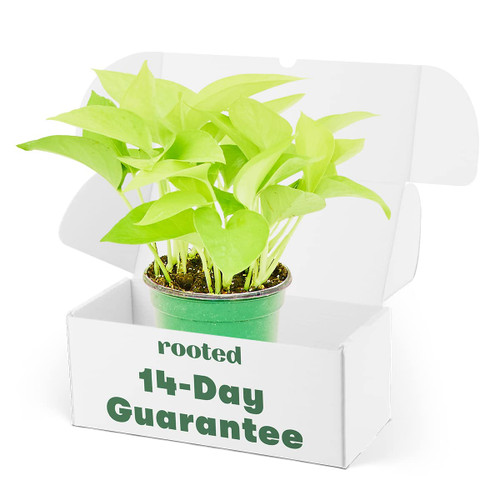Pothos Jade, or Epipremnum aureum 'Jade', is an attractive vining plant with stunning green foliage that can add a touch of nature to any living space. Its thick, glossy, heart-shaped leaves effectively filter airborne toxins. Pothos Jade is incredibly tough and drought-resistant. It is so low-maintenance that it is also called Devil's ivy, indicating that it is almost impossible to kill. This plant can tolerate many different lighting conditions, making it a perfect houseplant for homes and offices. This air-purifying plant can reach up to 30 feet indoors. You can plant it in a hanging basket, or give it some support to climb up a shelf or trellis. Pothos Jade prefers bright, indirect sunlight but also tolerates low-light conditions, as well as artificial and fluorescent lighting. Deep shade, however, can slow down its growth and makes it leggy. Avoid harsh direct sun to prevent scorching leaves. Pothos Jade is drought-resistant and only needs watering about once per week, or whenever the top 2" of the soil is dry. It does not like wet, water-logged soil, so drain well after each watering. Water more in brighter light conditions and less when the plant is placed in a low-light spot. The best soil for this plant is well-drained, porous potting soil. A mixture of houseplant potting soil with peat moss, vermiculite, or perlite is ideal for this plant. This plant grows best in average room temperatures (between 65°F-85°F). This plant does not grow well when the temperature drops below 50°F. Pothos thrives in normal indoor humidity, and it is recommended that you mist your plant and use a humidifier when the environment is too dry (humidity level falls below 50%). This plant should be fertilized once during the growing season (spring/summer) with diluted houseplant fertilizer. This plant contains calcium oxalate crystals within its leaves and stems that can be toxic to animals and humans, so keep it out of reach.
Pothos Jade - Epipremnum aureum 'Jade' (4" Grower Pot) - Trailing Air- Purifying, Easy to Grow Houseplant - Live Healthy Houseplant for Home Office Decoration
Was:
$110.20
Now:
$55.10
- SKU:
- ZDW630515
- UPC:
- 783128448298
- Condition:
- New
- Availability:
- Free Shipping from the USA. Estimated 2-4 days delivery.







